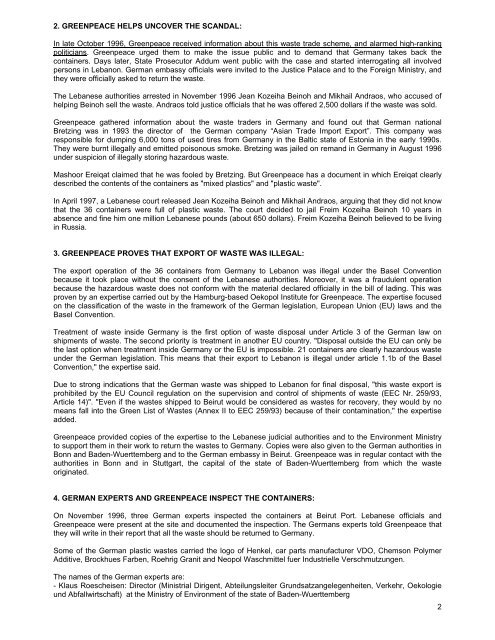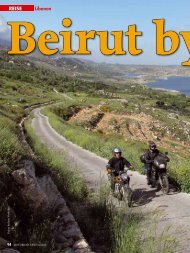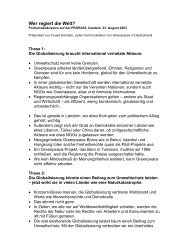WASTE TRADE IN THE MEDITERRANEAN ... - Fouad Hamdan
WASTE TRADE IN THE MEDITERRANEAN ... - Fouad Hamdan
WASTE TRADE IN THE MEDITERRANEAN ... - Fouad Hamdan
Create successful ePaper yourself
Turn your PDF publications into a flip-book with our unique Google optimized e-Paper software.
2. GREENPEACE HELPS UNCOVER <strong>THE</strong> SCANDAL:<br />
In late October 1996, Greenpeace received information about this waste trade scheme, and alarmed high-ranking<br />
politicians. Greenpeace urged them to make the issue public and to demand that Germany takes back the<br />
containers. Days later, State Prosecutor Addum went public with the case and started interrogating all involved<br />
persons in Lebanon. German embassy officials were invited to the Justice Palace and to the Foreign Ministry, and<br />
they were officially asked to return the waste.<br />
The Lebanese authorities arrested in November 1996 Jean Kozeiha Beinoh and Mikhail Andraos, who accused of<br />
helping Beinoh sell the waste. Andraos told justice officials that he was offered 2,500 dollars if the waste was sold.<br />
Greenpeace gathered information about the waste traders in Germany and found out that German national<br />
Bretzing was in 1993 the director of the German company “Asian Trade Import Export”. This company was<br />
responsible for dumping 6,000 tons of used tires from Germany in the Baltic state of Estonia in the early 1990s.<br />
They were burnt illegally and emitted poisonous smoke. Bretzing was jailed on remand in Germany in August 1996<br />
under suspicion of illegally storing hazardous waste.<br />
Mashoor Ereiqat claimed that he was fooled by Bretzing. But Greenpeace has a document in which Ereiqat clearly<br />
described the contents of the containers as "mixed plastics" and "plastic waste".<br />
In April 1997, a Lebanese court released Jean Kozeiha Beinoh and Mikhail Andraos, arguing that they did not know<br />
that the 36 containers were full of plastic waste. The court decided to jail Freim Kozeiha Beinoh 10 years in<br />
absence and fine him one million Lebanese pounds (about 650 dollars). Freim Kozeiha Beinoh believed to be living<br />
in Russia.<br />
3. GREENPEACE PROVES THAT EXPORT OF <strong>WASTE</strong> WAS ILLEGAL:<br />
The export operation of the 36 containers from Germany to Lebanon was illegal under the Basel Convention<br />
because it took place without the consent of the Lebanese authorities. Moreover, it was a fraudulent operation<br />
because the hazardous waste does not conform with the material declared officially in the bill of lading. This was<br />
proven by an expertise carried out by the Hamburg-based Oekopol Institute for Greenpeace. The expertise focused<br />
on the classification of the waste in the framework of the German legislation, European Union (EU) laws and the<br />
Basel Convention.<br />
Treatment of waste inside Germany is the first option of waste disposal under Article 3 of the German law on<br />
shipments of waste. The second priority is treatment in another EU country. "Disposal outside the EU can only be<br />
the last option when treatment inside Germany or the EU is impossible. 21 containers are clearly hazardous waste<br />
under the German legislation. This means that their export to Lebanon is illegal under article 1.1b of the Basel<br />
Convention," the expertise said.<br />
Due to strong indications that the German waste was shipped to Lebanon for final disposal, "this waste export is<br />
prohibited by the EU Council regulation on the supervision and control of shipments of waste (EEC Nr. 259/93,<br />
Article 14)". "Even if the wastes shipped to Beirut would be considered as wastes for recovery, they would by no<br />
means fall into the Green List of Wastes (Annex II to EEC 259/93) because of their contamination," the expertise<br />
added.<br />
Greenpeace provided copies of the expertise to the Lebanese judicial authorities and to the Environment Ministry<br />
to support them in their work to return the wastes to Germany. Copies were also given to the German authorities in<br />
Bonn and Baden-Wuerttemberg and to the German embassy in Beirut. Greenpeace was in regular contact with the<br />
authorities in Bonn and in Stuttgart, the capital of the state of Baden-Wuerttemberg from which the waste<br />
originated.<br />
4. GERMAN EXPERTS AND GREENPEACE <strong>IN</strong>SPECT <strong>THE</strong> CONTA<strong>IN</strong>ERS:<br />
On November 1996, three German experts inspected the containers at Beirut Port. Lebanese officials and<br />
Greenpeace were present at the site and documented the inspection. The Germans experts told Greenpeace that<br />
they will write in their report that all the waste should be returned to Germany.<br />
Some of the German plastic wastes carried the logo of Henkel, car parts manufacturer VDO, Chemson Polymer<br />
Additive, Brockhues Farben, Roehrig Granit and Neopol Waschmittel fuer Industrielle Verschmutzungen.<br />
The names of the German experts are:<br />
- Klaus Roescheisen: Director (Ministrial Dirigent, Abteilungsleiter Grundsatzangelegenheiten, Verkehr, Oekologie<br />
und Abfallwirtschaft) at the Ministry of Environment of the state of Baden-Wuerttemberg<br />
2




